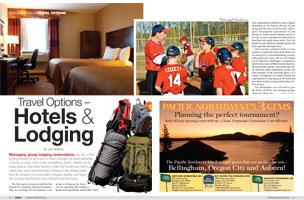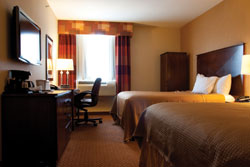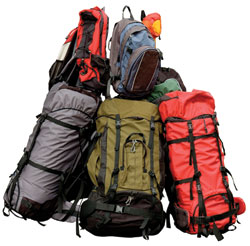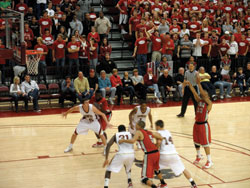
 Managing group lodging reservations can be a challenging process for any event or team manager. As travel demands increase at every level of the competitive sports market, so do travel options. And while finding a hotel that meets your team's needs may seem overwhelming, following a few simple guidelines to increase communication between parties can make the process significantly more efficient and satisfying.
Managing group lodging reservations can be a challenging process for any event or team manager. As travel demands increase at every level of the competitive sports market, so do travel options. And while finding a hotel that meets your team's needs may seem overwhelming, following a few simple guidelines to increase communication between parties can make the process significantly more efficient and satisfying.
The first step is to keep in mind that this should be a mutually beneficial partnership. In exchange for the business your group is bringing the hotel, you are expecting that certain requests and expectations will be met. Therefore, negotiating an attractive rate is largely dependent on two factors: the size of your group and the level of service they will require. Keeping the expectations of your group in mind, decide whether price or service is more important and then select a hotel that best meets those needs. Don't be afraid to seek bids from multiple hotels and then negotiate amongst them.
Once you have selected a hotel, it is important to remember that while hotels are accustomed to accommodating groups, each group can come with its own unique set of logistical challenges. Competitive sports teams have different needs than traditional leisure groups, and needs may differ between teams depending on the size and schedule of the traveling party. As a result, it's imperative to clearly identify the expectations of your group to the hotel and give them timely, accurate information before arrival.
 |
| © Susan Leggett - Dreamstime.com |
The information you will need to give the hotel will likely vary amongst groups. However, there are simple criteria to consider that will help you evaluate the depth of your group's needs and what the hotel will require in order to meet those needs. One of the main criteria is the number of travelers in your group: large (120+ people), medium (40-119) or small (10-39). Within these categories, hotel requirements will begin to fluctuate, with larger groups often needing to provide more information and advanced notice than smaller groups. Nevertheless, there are some principles that can be applied to all group travel arrangements. For instance:
If possible, always give the hotel your group's itinerary. This should include the times and activities from departure until your group returns home. Even a tentative itinerary is better than nothing as it gives the hotel an idea of the schedule they will need to keep in order to make sure the rooms are ready upon arrival, food service is appropriately timed, and general procedures can be executed with minimal disruption to your group. If confidentiality is a concern, make it clear that the itinerary is not to be released without prior consent. Consider discussing the itinerary with the hotel even during initial negotiations. For instance, if a sports team is competing on the day of departure, you may need to ensure a late check-out.
 Do your best to adhere to the hotel's request for a rooming list. With many large groups, particularly sports teams that frequently have players unable to travel on short notice, compiling an accurate rooming list can be very difficult. However, many hotels require a rooming list so they can secure the requested rooms. To bypass this dilemma, submit the most accurate list possible or send a list from past travel. In most cases, once the rooms are secured, the names can be easily changed as they become final.
Do your best to adhere to the hotel's request for a rooming list. With many large groups, particularly sports teams that frequently have players unable to travel on short notice, compiling an accurate rooming list can be very difficult. However, many hotels require a rooming list so they can secure the requested rooms. To bypass this dilemma, submit the most accurate list possible or send a list from past travel. In most cases, once the rooms are secured, the names can be easily changed as they become final.
A check-in procedure should be designated to eliminate confusion. Ask the hotel if they can set up check-in away from the main lobby to eliminate congestion. To get your group to their rooms as quickly as possible, request that tables be ready with the key packets laid out in alphabetical order. It's also recommended that a hotel staff member be on hand to assist if keys are missing or do not work. Not only will your group welcome a quick check-in, but the hotel will also appreciate clearing their main lobby or alternative entrance for their other guests.
Inform the hotel if there are any special room accommodation or amenity needs. Large groups also bring the likelihood of several varying personal requests from the travelers. Parents, coaches or other guardians may prefer that certain deluxe amenities in the rooms be removed or disconnected if the group consists mainly of students. Another group may request that a newspaper be delivered to their doors in the morning. Most hotels will be happy to oblige these requests, but they should be given as much advance notice as possible. This becomes more important if the group is particularly large.
Notify the hotel what can and cannot be charged to the master bill. Even when groups are notified of rules they may need to adhere to, certain individuals may try to step outside those boundaries. The hotel should always know if they are to refuse requests to charge items to the master bill and who they should notify in such an occurrence.
Security concerns or procedures should be communicated if the hotel or its staff will be involved. If the group is considered high-profile, or has a high-profile member, ask the hotel if their rooms can be positioned so they have easy access to meeting rooms, exits or "back of the house" routes. Let the hotel staff know if you will require their assistance in moving throughout the hotel with limited interactions. It is also highly important that the hotel knows who has the authority to make changes or perform tasks such as requesting a master key for bed-checks.
 |
| © Eric Broder Van Dyke - Dreamstime.com |
Keep in mind that meal functions are largely dependent on your group, not their size. Hotels are accustomed to hosting both large and small banquettes, so accommodating any size group is typically procedural. Nevertheless, you will need to discuss with the hotel what the meals should include and what set-up best suits the expectations of your group. A basketball team, for example, won't need the elaborate table settings that a wedding party would expect. In the same scenario, the basketball team will also need greater serving sizes. These expectations need to be communicated to the hotel so they can prepare accordingly.
Preparing a group lodging reservation is a multi-step process that requires significant communication between the traveling party and the hotel. As the go-between for these two, it is imperative that you voice the expectations of the group and work with the hotel to create a favorable partnership. Providing the hotel with as much information as possible by following the outlined procedures is the best way to ensure success. It can be an overwhelming process at times, but when in doubt, ask the hotel directly what they need from you. In the end, everyone will walk away feeling rewarded.

